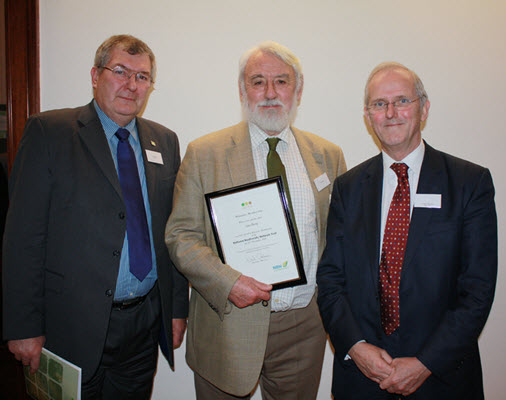The NBN Trust is sad to note the passing of Professor Sam Berry.
Professor Berry was awarded Honorary membership of the NBN Trust in November 2009 in recognition of his contribution to the development of biological recording in the UK.
Paul Harding wrote the citation for his prospective membership of the NBN Trust, which talks of his importance to biological recording and notably to the establishment of the NBN. This can be read in full below.
The proposal for membership was unanimously supported by the NBN Board of Trustees and the award was presented to him at the NBN Conference in November 2009.

Professor Robert James (Sam) Berry
Citation for prospective Honorary Membership of NBN Trust
Throughout his long career Sam Berry has championed the contributions made by amateurs to the study of “natural history”. The author of four books in the New Naturalist series, two of which (The Natural History of Orkney and The Natural History of Shetland) drew heavily on and acknowledged fully the work of others, many of them amateurs. Perhaps his most profound contribution in relation to the development of the role of amateurs in British natural history is less well known, but without it the process that led to the National Biodiversity Network would probably never have begun.
In biological recording circles, Professor Berry is possibly best known for his work on genetics and evolution, and on the natural history of islands. He is an active Christian, enjoys remembering hill-walking on Munros, is a prolific author and communicator of his research and interests in these and many other topics. He was Professor of Genetics in the University of London from 1974 to 2000 and is subsequently Emeritus Professor.
Perhaps Sam’s most significant contribution to the development of biological recording in the UK has been over-shadowed by subsequent developments, but at the time his input was crucial in the process of getting biological recording taken seriously. Without Sam’s commitment to ‘the cause’ in the 1980s it is unlikely that the Co-ordinating Commission for Biological Recording would have been formed and, without CCBR, the NBN would never have been conceived.
In September 1984, the Biology Curators’ Group (BCG) hosted the seminar Biological Recording and the use of site based biological information. The main conclusions of the meeting were that steps should be taken to improve the financial situation and status of recording, and that those involved should co-operate to reach agreed standards for recording and the management of data. Sam Berry made an important contribution to the debate at this meeting, which he followed up during his final year as President of the Linnean Society in 1985, and subsequently as its immediate Past President. Above all, he chaired a small working party under the aegis of the Linnean Society, which produced the report Biological Survey, Need and Network published by the Society in 1988. Sam compiled this brief, but skilfully worded report from a variety of contributions by members of the working party whilst he was holidaying in Scotland, in between bagging a few Munros.
The Linnean Society Working Party report concluded that “Although considerable effort is expended on biological survey and surveillance in the UK by voluntary, professional and statutory bodies, no effective system exists for the overall co-ordination of recording and monitoring of wildlife and habitat resources”. The six basic recommendations of the report are as relevant today as they were 21 years ago, but in particular it recommended the creation of a co-ordinating commission to plan and establish a national, computerized system and to investigate related issues such as the statutory and legal framework. The Linnean Society report was the catalyst for a large meeting of interested organisations and institutions hosted by NERC at the Royal Society in February 1989 which accepted, in large measure, the findings of the working party and led directly to the establishment of Co-ordinating Commission for Biological Recording under the chairmanship of Sir John Burnett.
It is perhaps characteristic of Sam Berry that he recognized an issue (the comparative chaos that was biological recording in the UK in the 1980s), felt able to provide crucially important and timely effort to addressing that issue, drew on the expertise of others (willingly given), prepared a readable synthesis and clear recommendations, oiled the “political wheels” and then was content to let others “run with the ball”.
At a more local scale Sam also had an important role in the establishment of a local biological records centre in Orkney, by providing timely support and advocacy to the volunteers that, like him, recognized the need for detailed local records to be held and made accessible locally.
Paul Harding
17 July 2009
